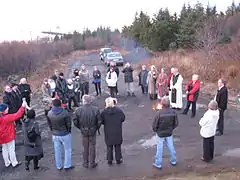Hof Ásatrúarfélagsins
Hof Ásatrúarfélagsins is a religious building under construction in Reykjavík, Iceland. When finished it will be used by the Heathen organization Ásatrúarfélagið for religious ceremonies, concerts and exhibitions.[1][2] It is Iceland's first major hof to the Norse gods since the Viking Age.[3] It is located on the southern slope of the hill Öskjuhlíð, close to Reykjavík University. The project has been under development since 2005, but has been delayed several times because of the 2008–2011 Icelandic financial crisis and problems with the design. It has been under construction since 2015.
| Hof Ásatrúarfélagsins í Öskjuhlíð | |
|---|---|
 A ceremony in 2009 at the location of the planned building | |

| |
| General information | |
| Status | Under construction |
| Location | Öskjuhlíð, Reykjavík, Iceland |
| Coordinates | 64°7′21.35″N 21°55′18.68″W |
| Groundbreaking | 20 March 2015 |
| Owner | Ásatrúarfélagið |
History
Development
In 2005, Ásatrúarfélagið decided to sell its house in Reykjavík which it had acquired in 1998. The real-estate value had at this point increased so much that the organization's long-time goal of building a hof in Reykjavík for its activities had become a realistic project.[4] Ásatrúarfélagið originally applied for a plot of land for a religious building in Elliðaárdalur. Reykjavík's mayor Ingibjörg Sólrún Gísladóttir instead suggested a location on the hill Öskjuhlíð, which Ásatrúarfélagið accepted in 2006.[5] However, this plot turned out to be within the safety zone of the Reykjavík Airport, so a new location nearby, on the southern slope of the same hill, was assigned in 2008.[6] Ásatrúarfélagið and its allsherjargoði Hilmar Örn Hilmarsson were especially pleased by the proximity between this location and the Reykjavík University.[5]
The land was donated by the city and the construction funds were provided by Ásatrúarfélagið. On 1 September 2008, five architectural firms submitted their respective proposals for the building's design to Ásatrúarfélagið's building committee.[7] When the building still was on a planning stage, the 2008 Icelandic banking collapse took place, which resulted in substantial financial losses for Ásatrúarfélagið, and the hof project was delayed by several years.[8]
In January 2015, Magnús Jensson's design was revealed. It was reported that construction was soon to begin. The building was reported to have a construction cost of 130 million Icelandic krónas.[5]
Construction
Construction officially broke ground at the solar eclipse of 20 March 2015. The building was then projected to be finished in the late summer of 2016.[5][9] However, the complicated design has caused technical problems and further delays. Immediately there were problems with the preparation of the site, which had the effect that actual construction did not begin until 2017.[10] In December 2017 it was expected to be finished by the end of 2018.[11]
In February 2019, Hilmar Örn said that the most optimistic expectation was for the building to be finished in December 2019, although he hoped that parts would be ready for active use already in the autumn that year. He explained that it was the dome that caused problems and that the project had gone severely over its original budget, with the costs now estimated at around 270 million krónas. He also revealed that Ásatrúarfélagið had looked at different models for potentially crowdfunding parts of the costs, although stressed that the funders in that case must receive something in return for their money. He explained that it was crucial for the organization's dignity to not take any bank loan.[12]
In June 2019, Hilmar Örn said that the building would be constructed in stages. He hoped that the office part would be ready in the winter, but that even if the crowdfunding campaign was a success, the whole project could take up to two years to finish.[10] In February 2020, Hilmar Örn expected the office part to be ready in 2020, and the dome to be finished in 2022. The projected cost was now 300 million krónas.[13]
Architecture and design

Hof Ásatrúarfélagsins was designed by the Icelandic architect and Ásatrúarfélagið member Magnús Jensson. Jensson wanted the building to look timeless and neither be a Viking Age pastiche nor specifically modern.[14] The aim was to represent a close relationship to earth, sky and sun.[1] The design incorporates numbers and geometry considered sacred by Ásatrúarfélagið, such as the numbers nine, 432,000 and the golden ratio.[5]
The building is made of concrete and local wood.[14] The main part will have an area of 350 square metres (3,800 sq ft) and hold a maximum of 250 people.[5] It has an oval shape and an inverted dome on top; the intention is to let in sunlight which changes on a daily and seasonal basis. It is built into the side of the hill and uses natural rock as one of its walls, allowing water to flow down the stone wall and be collected in pools.[14]
Next to the building is a memorial stone for Sveinbjörn Beinteinsson, Ásatrúarfélagið's first allsherjargoði. The monument was dedicated on 22 April 2010 with a ceremony that paid tribute to the local landvættir and several gods.[15]
The design allows the building to be expanded in the future. According to Hilmar Örn, there are preliminary plans for an expansion that would provide a facility for international research on subjects related to mythology.[2]
Name
The name used in the media and promotional material, "hof Ásatrúarfélagsins", is descriptive and means "The hall of the ōs faith association" or "The temple of the ōs faith association". The association has asked the public for proposals for the building's official name, but the final decision will be taken shortly before the consecration.[16]
See also
References
- Carlström, Vilhelm (4 July 2018). "Iceland's fastest growing religion will soon complete the first temple to Thor and Odin in 1000 years". Business Insider Nordic. Archived from the original on 16 September 2018.
- Birgir Olgeirsson (16 January 2015). "Héldu að Perlan væri nýtt hof ásatrúarmanna: "Ég hef verið að leiðrétta þetta"". Vísir.is (in Icelandic). Retrieved 6 February 2020.
- Reuters in Reykjavik (2 February 2015). "Iceland to build first temple to Norse gods since Viking age". The Guardian. Retrieved 6 February 2020.
- Óttar Ottósson (2005). "Af yfirlýsingum". Vor siður (in Icelandic) (2). Retrieved 6 February 2020.
- "A religion that speaks to people today". Iceland Monitor. 27 January 2015. Retrieved 6 February 2020.
- "Ásatrúarfélagið fær aðra lóð í Öskjuhlí". Vísir.is. 20 August 2007. Retrieved 6 February 2020.
- Egill Baldursson (2008). "Frá lögsögumanni". Vor siður (in Icelandic) (4): 16. Retrieved 6 February 2020.
- "Trúfélög ekki enn byrjuð að byggja". Vísir.is (in Icelandic). 26 October 2010. Retrieved 6 February 2020.
- "Fyrsta skóflustungan að hofi Ásatrúarfélagsins: „Þetta mun breyta öllu fyrir okkur"". Vísir.is (in Icelandic). 20 March 2015. Retrieved 6 February 2020.
- Eva Björk Benediktsdóttir (23 June 2019). "Bygging ásatrúarhofs dregist mikið" (in Icelandic). RÚV. Retrieved 6 February 2020.
- "Iceland's first pagan temple in 1000 years ready in late 2018". Iceland Monitor. 2 December 2017. Retrieved 6 February 2020.
- Sigurður Mikael Jónsson (7 February 2019). "Hyggjast hópfjármagna hof eftir framúrkeyrslu". Fréttablaðið (in Icelandic). Retrieved 6 February 2020.
- Birgir Olgeirsson (3 February 2020). "Taílenskir ásatrúarmenn gáfu 1000 evrur vegna höfuðhofsins". Vísir.is (in Icelandic). Retrieved 6 February 2020.
- McMahon, Neil (14 February 2015). "Iceland's Asatru pagans reach new height with first temple". BBC. Retrieved 6 February 2020.
- "Minnisvarði um Sveinbjörn allsherjargoða". Vísir.is. 22 April 2010. Retrieved 6 February 2020.
- Guðmundur Magnússon (30 November 2017). "Hofið tilbúið síðla á næsta ári". Morgunblaðið (in Icelandic). Retrieved 6 February 2020.
Further reading
- Downing, Ross (2017). A Heathen Mecca: Interpreting the International Germanic Contemporary Pagan Response to the Icelandic Temple (Master). University of Gothenburg. Retrieved 22 October 2019.